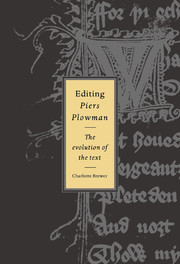Book contents
- Frontmatter
- Contents
- Acknowledgements
- Abbreviations
- Note on the texts
- Introduction
- Part I The early phase
- Part II The late nineteenth century
- Part III The Skeat aftermath
- Part IV Chambers and Grattan, Knott and Fowler
- 12 Chambers 1909–1910
- 13 Chambers versus Knott
- 14 Chambers' graduate students
- 15 Chambers 1931
- 16 Chambers 1935–1942
- 17 The Chambers and Grattan collations
- 18 Grattan and Kane
- 19 Knott and Fowler, Donaldson, Mitchell, and Russell
- Part V The Athlone Press edition
- Part VI Epilogue: the Athlone aftermath: Schmidt, Pearsall, Rigg-Brewer, et al.
- Works cited
- General index
- Index of manuscripts
- CAMBRIDGE STUDIES IN MEDIEVAL LITERATURE
17 - The Chambers and Grattan collations
Published online by Cambridge University Press: 20 August 2009
- Frontmatter
- Contents
- Acknowledgements
- Abbreviations
- Note on the texts
- Introduction
- Part I The early phase
- Part II The late nineteenth century
- Part III The Skeat aftermath
- Part IV Chambers and Grattan, Knott and Fowler
- 12 Chambers 1909–1910
- 13 Chambers versus Knott
- 14 Chambers' graduate students
- 15 Chambers 1931
- 16 Chambers 1935–1942
- 17 The Chambers and Grattan collations
- 18 Grattan and Kane
- 19 Knott and Fowler, Donaldson, Mitchell, and Russell
- Part V The Athlone Press edition
- Part VI Epilogue: the Athlone aftermath: Schmidt, Pearsall, Rigg-Brewer, et al.
- Works cited
- General index
- Index of manuscripts
- CAMBRIDGE STUDIES IN MEDIEVAL LITERATURE
Summary
As we have seen, Hitchcock tidied up the Piers Plowman material left by Chambers and dispatched it to the National University of Wales for safekeeping in June 1942. After the war, it was transferred to the library of University College, where access was restricted to Grattan and Kane. It seems likely that much of the material she records as having lodged at the University of Wales was either lost, or dispersed by Grattan in the process of re-examining the embryo edition and sorting out the papers and rotographs.
The surviving material, which is piecemeal, makes it difficult to work out precisely how Chambers and Grattan conducted their work after 1912, when proofs were printed of the Trinity A-MS Pro-IV. The most interesting element is a set of master collations. Reading through these gives the impression that the process of collating, checking and revising was unsystematic and at times chaotic. A note in Chambers' hand on the ‘Present Condition of Collations’ in October 1919 (Item 8), states that all the A-MSS save W, N, and K had been collated as far as Passus VIII. Of W, Chambers notes that occasional passages only have been collated beyond Passus VI 46 ‘for special purpose’ – i.e., at points of particular textual difficulty. Continuous collation of K had stopped at around the same place, at Passus VI 38.
- Type
- Chapter
- Information
- Editing Piers PlowmanThe Evolution of the Text, pp. 303 - 309Publisher: Cambridge University PressPrint publication year: 1996



